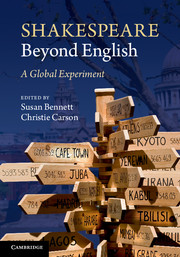Book contents
- Frontmatter
- Contents
- List of Illustrations
- List of colour plates
- Notes on contributors
- Foreword
- Acknowledgements
- Introduction
- The Globe to Globe Festival: An Introduction
- Performance Calendar
- Week One
- Week Two
- Chapter Seven Performing cultural exchange in Richard III
- Chapter Eight ‘A girdle round about the earth’
- Chapter Nine Intercultural Rhythm in Yohangza's Dream
- Chapter Ten Art of darkness
- Chapter Eleven Neo-liberal Pleasure, Global Responsibility and the South Sudan Cymbeline
- Chapter Twelve Titus in No Man's Land
- Chapter Thirteen Tang Shu-wing's Titus and the acting of violence
- Chapter Fourteen ‘A strange brooch in this all-hating world’
- Chapter Fifteen ‘We want Bolingbroke’
- Chapter Sixteen O-thell-O
- Week Three
- Week Four
- Week Five
- Week Six
- Afterwords
- Index
- Plate section
Chapter Fifteen - ‘We want Bolingbroke’
Ashtar's Palestinian Richard II
Published online by Cambridge University Press: 05 June 2014
- Frontmatter
- Contents
- List of Illustrations
- List of colour plates
- Notes on contributors
- Foreword
- Acknowledgements
- Introduction
- The Globe to Globe Festival: An Introduction
- Performance Calendar
- Week One
- Week Two
- Chapter Seven Performing cultural exchange in Richard III
- Chapter Eight ‘A girdle round about the earth’
- Chapter Nine Intercultural Rhythm in Yohangza's Dream
- Chapter Ten Art of darkness
- Chapter Eleven Neo-liberal Pleasure, Global Responsibility and the South Sudan Cymbeline
- Chapter Twelve Titus in No Man's Land
- Chapter Thirteen Tang Shu-wing's Titus and the acting of violence
- Chapter Fourteen ‘A strange brooch in this all-hating world’
- Chapter Fifteen ‘We want Bolingbroke’
- Chapter Sixteen O-thell-O
- Week Three
- Week Four
- Week Five
- Week Six
- Afterwords
- Index
- Plate section
Summary
Ashtar Theatre's Richard II opened with a scene not found in Shakespeare's original text but one that is crucial to the action of the play: the murder of the duke of Gloucester. Two jailors gave Gloucester (George Ibrahim) a mirror and a razor, and, as he cautiously began to shave his face and look at himself in the mirror, his throat was cut by one of his captors. With his forehead covered in blood and a look of confusion on his face, Gloucester then watched from the background as the opening scene of Shakespeare's play unfurled on stage. In choosing to begin the performance with this scene, Irish director Conall Morrison brought to the fore the turmoil surrounding the reign of a humorously narcissistic Richard (Sami Metwasi). The powerful image of the captors – faces covered to avoid recognition – became quickly juxtaposed against the rich military attire of Henry Bolingbroke (Nicola Zreineh) and Thomas Mowbray (Ihab Zahdeh) as they accused each other of Gloucester's death. Each threw down his gage in anger and challenged the other to a duel; Richard exiled both from England for their behaviour and seized Bolingbroke's inheritance to fund battles in Ireland. Bolingbroke returned to reclaim his inheritance, and the Welsh abandoned Richard's cause to join Bolingbroke. The stage was then taken over by actors with covered faces carrying flags in Palestine's national colours and shouting ‘We want Bolingbroke’; Palestinian flags were unfurled by some in the audience and remained on display until the end of the show.
The clever doubling of Gloucester and York (George Ibrahim) served to remind those who are familiar with the text of the subplot of Aumerle's treason against the king, although this part of the action was omitted because of time constraints. It would have been interesting to see how this would have played out and whether the duchess of Gloucester (Iman Aoun) would also have doubled as the duchess of York, recasting herself as the mother of a traitor. In addition to the doubling, the use of the playing space was also especially effective, allowing the earl of Northumberland (Edward Muallem) to move back and forth through the audience to convey messages between Richard and Bolingbroke, articulating the divide between the two characters on stage while they negotiated the terms of Bolingbroke's inheritance (see Colour Plate 6).
- Type
- Chapter
- Information
- Shakespeare beyond EnglishA Global Experiment, pp. 126 - 128Publisher: Cambridge University PressPrint publication year: 2013



